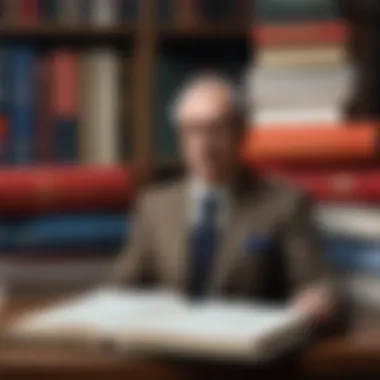Exploring Viktor Pelevin's Latest Novel: A Deep Dive


Intro
Viktor Pelevin stands as a prominent figure in contemporary literature, recognized for his ability to weave complex narratives interlaced with philosophical inquiry and socio-political commentary. His latest novel not only continues this tradition but also pushes boundaries in new directions. This article aims to unravel the intricacies of Pelevin's work, diving into the themes and narrative techniques utilized within the novel.
In this exploration, we will dissect the author's distinctive stylistic choices, evaluate character development, and consider the socio-political context that shapes the text. Moreover, we will assess the reception of the novel among critics and readers alike, positioning it within Pelevin's extensive body of work. By doing so, we aim to create a comprehensive guide that appeals to literature enthusiasts, students, and educators, illuminating the nuances of this significant literary contribution.
Foreword to Viktor Pelevin's Literary World
Viktor Pelevin stands as a prominent figure in contemporary Russian literature. His works explore complex themes that resonate deeply with readers. Understanding his literary world offers insight into his unique approach to storytelling. This section sets the stage for delving into Pelevin's new novel, contextualizing the discussion within his established career and thematic concerns.
Overview of Pelevin's Career
Viktor Pelevin was born in 1970 in Moscow. He graduated from the Moscow Power Engineering Institute, transitioning later into writing. His career began in the 1990s, a period marked by dramatic changes in Russian society. Pelevin gained international recognition with works like "Omon Ra" and "Generation 'P'". These novels tackled the absurdities of the post-Soviet landscape, often blending reality with surreal elements.
As Pelevin's body of work expanded, he established a reputation for his philosophical explorations and intricate narrative structures. His writing often involves motifs that bridge Russian folklore with modern existential questions. This connection allows readers to engage with his texts on multiple levels.
Pelevin’s themes reflect his views on culture, power, and identity. His novels frequently feature satire and irony, challenging societal norms. Over the years, he has developed a distinct style that combines deep philosophical inquiries with accessible storytelling. Pelevin is not just a writer; he is a cultural commentator, reflecting the complexities of contemporary life.
Previous Works and Themes
Pelevin's previous works showcase a range of recurring themes that permeate his literature. Among these, the exploration of identity and the nature of reality stand out. For instance, in "The Life of Insects," he examines the human condition through the lives of insects, blurring the line between human and animal experiences.
Another prevalent theme is the critique of commercialism and media influence. In "Generation 'P'", he delves into the world of advertising and media manipulation, revealing how these forces shape modern consciousness. Through irony and wit, Pelevin invites readers to consider the implications of a society inundated by images and messages.
Additionally, spiritual and existential themes frequently emerge in his work. The search for meaning, as seen in "The Helmet of Horror," confronts the labyrinth of modern existence. Pelevin's keen awareness of the human psyche makes his narratives engaging and thought-provoking.
This section of the article aims to frame the discussion around Pelevin's new novel within the broader spectrum of his literary contributions, allowing for a richer analysis of his latest themes and narrative techniques.
The New Novel: A Synopsis
Understanding the new novel is crucial to grasp the broader narrative and context in Viktor Pelevin's work. This section provides an insightful overview of the plot and key characters, which form the backbone of the story. Knowing the plot allows readers to appreciate the intricate layers of meaning and symbolism that Pelevin masterfully interweaves throughout the narrative. It also sets the stage for an analysis of themes, characterization, and the author's unique narrative techniques.
Plot Summary
The plot unfolds in a dystopian future, where the boundary between reality and illusion becomes increasingly blurred. The protagonist, a disillusioned intellectual, embarks on a journey that confronts not only his personal demons but also the broader societal issues that plague the world around him. This journey takes various twists and turns, leading readers through a labyrinth of existential questions and moral quandaries.
Central events include pivotal encounters with characters representing different facets of society, from the disenchanted youth to the powerful elite. As the story progresses, the protagonist grapples with the consequences of his choices, raising questions about agency and determinism. The narrative is rich with moments of introspection and revelation, allowing readers to reflect on their own beliefs and values.
Main Characters and Characterization
Characters in Pelevin’s new novel are not mere bystanders; they embody the complex tensions between individual desires and societal expectations. The protagonist, a reflective and often cynical figure, serves as a lens through which the reader can explore the nuances of contemporary existence.
Supporting characters include:


- A charismatic leader who symbolizes authority and misguided ideals.
- An enigmatic figure who challenges the protagonist's views, pushing him towards revelations.
- A group of friends who represent various perspectives on life and society, enriching the narrative texture.
Characterization is marked by depth and contradiction. Each character faces their inner conflicts, shedding light on larger societal dynamics. Their interactions reveal Pelevin's commentary on human behavior and social structures. The dialogue between characters often echoes the novel’s overarching themes, such as existentialism, which continually invites the reader to question the meaning of life.
"The characters in Pelevin's novel are complex and multilayered, providing a mirror to our own struggles in a rapidly changing world."
In summation, this section serves as a blueprint for engaging with the narrative. By examining the plot and characters, readers can better appreciate the profound thematic explorations and innovative narrative techniques that Pelevin employs in his latest work.
Themes in the Novel
Viktor Pelevin's latest novel provides a rich tapestry of themes that resonate with contemporary issues and timeless philosophical queries. In examining these themes, readers can peel back layers of meaning that reveal insights into the human condition. The themes are integral to understanding the novel, as they offer a critical lens through which readers can interpret both the narrative and the broader societal implications. Here, we explore three main themes: existentialism and meaning, societal critique, and the interplay between technology and humanity.
Existentialism and Meaning
Existentialism emerges as a pivotal theme in this novel, probing questions about human existence, purpose, and authenticity. Pelevin's characters often grapple with their reality, seeking deeper meaning in a world that can seem arbitrary and chaotic. This quest for understanding is not just personal; it reflects a universal struggle. The narrative delves into how meaning is constructed and the existential choices characters face. Through philosophical musings and vivid scenarios, Pelevin challenges readers to reflect on their lives and the choices they make.
The author’s approach offers a blend of dark humor and stark realism, inviting one to reflect on life’s absurdities.
"The contemplation of existence leads characters to confront their own fears and desires, often resulting in profound revelations that redefine their understanding of life."
Societal Critique
Pelevin does not shy away from scrutinizing societal constructs and norms. His portrayal of modern Russia acts as both a reflection and a critique of socio-political realities. Within the novel, there are sharp observations on consumerism, political corruption, and the alienation prevalent in contemporary society. The narrative intertwines personal experiences with larger social commentary, positioning the reader to critically assess the world around them.
Readers will find parallels between the experiences of the characters and the broader societal challenges.
- Consumer Culture: Characters navigate a landscape dominated by materialism, raising questions about true fulfillment versus superficial satisfaction.
- Political Disillusionment: The novel highlights the apathy and mistrust toward governmental systems, prompting discussions about civic responsibility.
The critique of society is not merely negative; it serves as an invitation to consider improvement and innovation.
Technology and Humanity
In an age of rapid technological advancement, Pelevin crafts a nuanced exploration of the relationship between humanity and technology. The characters engage with technology in ways that reveal both its potential benefits and inherent dangers. This theme raises important questions about identity in the digital age, interpersonal connections, and what it means to be human.
The narrative intertwines technology with philosophical inquiry, encouraging reflection on how advances shape societal interactions. Pelevin explores themes such as:
- Dependency on Technology: Characters often find themselves reliant on digital devices, challenging the boundaries between the real and virtual lives.
- Loss of Authenticity: The encroachment of technology brings forth a crisis of identity, where characters struggle to maintain genuine relationships.
Through this exploration, Pelevin underscores the need for balance and mindfulness in a world increasingly mediated by technology.
In summary, the themes in Pelevin's new novel are interwoven to provide a comprehensive look at existential questions, societal critiques, and the impact of technology on human life. Each theme serves not only to enhance the narrative but also to engage readers in deeper conversations about the state of contemporary existence.
Narrative Techniques
Narrative techniques play a crucial role in understanding Viktor Pelevin's latest novel. They shape how the story unfolds and how readers engage with the text. The use of varied narrative approaches can create depth, offer multiple viewpoints, and enhance thematic exploration. In Pelevin's work, these techniques are essential for establishing connections between the characters, their circumstances, and the overarching messages of the narrative.


Point of View and Perspective
The point of view in Pelevin’s novel significantly impacts the reader's experience. This choice influences what information is revealed and how it shapes our understanding of the characters. For example, shifting between first-person and third-person perspectives can create a sense of immediacy or distance. In this novel, Pelevin may choose a subjective view to immerse readers in the protagonist's thoughts, feelings, and existential dilemmas. Alternatively, a more detached perspective allows an exploration of the broader societal context.
The emphasis on perspective also highlights how individuals perceive reality differently. Through unique character insights, Pelevin illustrates the complexity of truth and perception in modern society. This method encourages readers to reflect on their own viewpoints and the narratives they construct in their daily lives.
Use of Symbolism
Symbolism is another technique that Pelevin masterfully employs in his novel. Symbols can encapsulate complex ideas and themes in a concise manner. Objects, actions, and even characters often represent broader concepts, providing layers of meaning. For instance, technology may symbolize both progress and alienation, capturing the duality of modern existence.
Through careful selection of symbols, Pelevin invites readers to decipher hidden meanings. This engagement challenges them to look beyond the surface and consider the implications of what they encounter within the narrative. The deliberate and thoughtful use of symbols enhances the thematic richness of the novel.
Intertextuality and References
Intertextuality is a defining aspect of Pelevin’s narrative style. He often weaves references from various literary, philosophical, and cultural texts into his stories. This technique enriches the reading experience by allowing the readers to make connections to outside works. It encourages a deeper understanding of the themes presented in the novel.
Pelevin’s references may range from classic literature to contemporary pop culture, reflecting the multifaceted nature of the human experience. By invoking familiar texts, he creates a dialogue between his work and the broader literary tradition. This not only situates his novel within a specific cultural context but also invites readers to explore new layers of meaning.
"Through his intertextual references, Pelevin builds a bridge between his narrative and the reader's own literary knowledge, effectively expanding the interpretive possibilities of his work."
In summary, the narrative techniques employed by Pelevin are vital for comprehending the depth of his latest novel. Through point of view, symbolism, and intertextual references, he craftily engages readers and invites them to explore complex themes with greater nuance.
Cultural and Historical Context
Understanding the cultural and historical context surrounding Viktor Pelevin's new novel is essential for grasping its depth and significance. Pelevin operates within a complex landscape marked by fluctuating socio-political dynamics and cultural shifts in Russia. This context shapes not only the themes explored in the novel but also the motivations driving characters and their relationships with each other and the world.
Historical events significantly influence literary works, as they provide a backdrop that informs the narrative and character development. Pelevin often reflects the tensions and contradictions inherent in post-Soviet Russian society. The fall of the Soviet Union, the rise of capitalist ideologies, and the ongoing struggle for identity in a rapidly changing nation are critical elements that permeate his writings. By examining these components, readers gain insight into the struggles and existential crises faced by Pelevin’s characters.
Historical Events Influencing the Novel
The historical context of Pelevin's work includes several pivotal events:
- Perestroika and Glasnost (1980s): These policies initiated by Mikhail Gorbachev reformed political and economic structures in the USSR, impacting societal norms and individual freedoms, which are reflected in Pelevin’s themes of freedom versus control.
- The Collapse of the Soviet Union (1991): This monumental event led to a crisis of identity for many Russians, which Pelevin explores through characters struggling to find their place in a new socio-political landscape.
- The Rise of Oligarchs (1990s): The transition to a capitalist economy created new social hierarchies and wealth disparities, themes prevalent in Pelevin's critique of contemporary Russian society.
These events not only provide context but also imbue the narrative with a sense of urgency and relevance, prompting readers to consider the implications of history on personal and collective identity.
Pelevin's Place in Contemporary Russian Literature
Viktor Pelevin occupies a unique position in the realm of contemporary Russian literature. His works are characterized by a blend of philosophical inquiry and sharp societal critique. As a significant figure, Pelevin's novels often serve as mirrors reflecting the complexities of post-Soviet life.
- Innovative Narrative Techniques: Pelevin's style defies conventional storytelling. He integrates elements of magical realism and postmodernism, offering readers a new lens through which to view reality. This approach makes his work relatable and engaging, especially for a younger audience navigating the complexities of modern life.
- Thematic Reverberations: His exploration of existentialism, technology, and socio-political critique resonates with contemporary readers, positioning him as a voice of his generation. Pelevin's writing encourages a critical reassessment of cultural narratives, creating a dialogue between the past and present.
- Influence on Emerging Authors: Pelevin's success has inspired a new wave of Russian authors, encouraging them to explore similar themes and styles, thus shaping the future of Russian literature.
A careful analysis of Pelevin's work elucidates how he synthesizes historical context with literary innovation. This dynamic interaction not only enriches the reading experience but also highlights the vital role of literature in understanding the world.
Critical Reception


The critical reception of Viktor Pelevin's new novel offers significant insights into its impact on literature and its place in contemporary discourse. Evaluating how critics and readers respond to a literary work can inform our understanding of its cultural relevance and thematic depth. This section will explore two key areas: literary critiques and analyses, as well as reader responses and feedback.
Literary Critiques and Analyses
Literary critics play a vital role in assessing the value and significance of Pelevin's writing. They dissect different elements of the novel, aiming to contextualize it within the broader scope of literary trends. Analyze the structure, thematic exploration, and character dynamics, critics often highlight Pelevin's distinctive narrative voice. Many reviews praise his ability to blend philosophy with satire. Critics frequently point out how the novel reflects contemporary dilemmas, thus intensifying its relevance.
In addition, journals like The New Yorker and Granta often publish in-depth analyses that focus on the intricacies of Pelevin's stylized prose. For example, the multifaceted use of metaphors and symbolism in the novel can leave both critics and scholars debating its meanings for years. Such critiques not only illuminate Pelevin's intentions but also stimulate ongoing scholarly discourse.
"Pelevin crafts narrative worlds that both confuse and enlighten, compelling readers to reconsider their views on reality."
– Literary Critic Review
Reader Responses and Feedback
Reader responses to Pelevin's new novel reveal a diverse array of interpretations and emotions. Some readers appreciate the complexity of the narrative and join in the debate about its existential themes. This participation creates a community of engaged readers who connect through discussions on platforms such as Reddit and Facebook. They often share differing viewpoints on how Pelevin addresses contemporary issues of technology and identity.
Others express frustration with the novel's intricate style. This reaction is crucial as it sheds light on how Pelevin's work can simultaneously captivate and alienate. Social media responses can be quite polarizing, leading to a lively exchange of ideas.
In summary, the critical reception of Viktor Pelevin's new novel is essential for understanding its literary significance. Critics' analyses unveil the text’s literary merits while reader feedback offers insight into its societal impact. Both perspectives enrich the conversation surrounding Pelevin's contributions to literature.
Comparison to Previous Works
Understanding the comparison between Viktor Pelevin's new novel and his earlier works is crucial for appreciating the depth and direction of his writing. This exploration reveals how Pelevin’s literary evolution not only reflects his changing personal insights but also mirrors significant societal transformations. Readers benefit from this analysis, as it offers a broader perspective of the motifs and stylistic progressions Pelevin employs. Placing the new novel within the context of his previous creations, we see continuity in his focus on existential concerns and societal critique, while also noting how innovation shapes his latest narrative.
Stylistic Evolution
In examining the stylistic evolution of Pelevin's work, we can see a marked shift in his approach to storytelling. Earlier novels like Chapayev and Void exhibit a direct, almost confrontational narrative style, which engages the reader immediately. The new novel, however, showcases a more nuanced and layered narrative technique. Pelevin uses complex structures and dialogues to challenge the reader's perceptions of reality, drawing them deeper into the philosophical musings that define his writing.
The language Pelevin employs also evolves. In his past works, the language can be dense and laden with cultural references, while the new novel opts for a more accessible form without sacrificing intellectual rigor. This stylistic shift reflects a desire to reach a wider audience while still engaging with high-level themes, making his voice resonate with both new readers and longtime fans. Pelevin's use of humor and satire continues to be effective, yet it often appears subtler, allowing for a richer exploration of themes without overshadowing the serious commentary.
Recurring Motifs
Recurring motifs in Pelevin's new novel reveal a consistent dialogue with his earlier works. Themes such as the nature of reality, identity crises, and the impact of technology resonate through his entire oeuvre. The exploration of consciousness, evident in projects like The Life of Insects, appears again, recontextualized to fit contemporary dilemmas.
A significant motif is the juxtaposition of the individual against the collective. In the new novel, characters grapple with the weight of societal expectations, a theme explored in Generator. The new novel's perspective on this motif offers fresh insights into modern existential struggles, illustrating how individual identity intertwines with socio-political landscapes.
The use of surrealism remains a hallmark of Pelevin’s writing. Elements of absurdity and dream-like sequences continue, enriching the narrative and challenging readers to question their perceptions of the mundane world. These motifs not only maintain continuity with Pelevin's past but also provide avenues for innovative interpretations that reflect changing cultural dynamics.
Pelevin’s works serve as a mirror to the evolving psyche of Russian society, encapsulating both personal and collective experiences through his unique lens of existential inquiry.
Closure: The Impact of Pelevin's New Novel
Viktor Pelevin's new novel marks another significant milestone in his literary journey. As a pivotal figure in contemporary Russian literature, his works often provoke thought and challenge societal norms. This novel not only reflects Pelevin's ongoing exploration of complex themes but also resonates with the shifting cultural landscape of modern society.
The conclusion serves as an evaluation of Pelevin's impact through this latest work. In understanding the novel's implications, we can discern how it addresses existential questions while critiquing modernity. The themes explored, such as technology's role in society and the nature of reality, encourage readers to reflect on their own lives and societal structures.
Legacy and Future Directions
Pelevin's legacy is deeply embedded in the post-Soviet literary framework. His ability to fuse the surreal with the mundane offers a unique perspective. The new novel adds layers to this legacy, positioning Pelevin as a crucial voice in analyzing contemporary existential dilemmas.
As for the future, the directions Pelevin may take are fascinating yet uncertain. The integration of new media forms and technologies into literature may find a place in his future works. This novel could signal a shift towards exploring wider questions surrounding digital identity and postmodern existence.
In summary, Pelevin's new novel is more than just another entry in his bibliography. It is a testament to his adaptability as an author and his understanding of the complexities of contemporary life.



